#suzong
Text
Burdened by fame
——Du Fu’s Death Shape
"Where can I find the Prime Minister's ancestral hall? There are many trees outside Jinguan City.
The green grass reflects the spring color on the steps, and the oriole sounds good in the sky through the leaves.
Three visits frequently troubled the world's plans, and two dynasties opened the hearts of veterans.
He died before leaving the army, which made the hero burst into tears. "
Du Fu wrote the poem "The Prime Minister of Shu".
In AD 760, the first year of Emperor Suzong's reign in the Tang Dynasty, Du Fu came to the bank of Huanhua Creek in Chengdu, Sichuan. It happened to be spring, and he planned to stay here forever. It was around this time that Du Fu wrote the poem "The Prime Minister of Shu".
It is true that there is only one Zhuge Liang in history. After that era, there will never be another one. However, people still believe that no matter what era they are in, the spirit is always there. Du Fu paid tribute to Zhuge Liang because he admired his value, perseverance and spirit as a human being. But the lovely thing about Du Fu is that even in such a serious mood, he can still find time to listen to the chirping birds in the cypress trees and feel the fragrance of nature. As for Zhuge Liang's death, he still had something to say: This was a life-long ambition that came to an abrupt end with the end of life. The ideal became a bubble and could no longer be practiced. All those with ambitions should cry together for this. The meaning of Zhuge Liang's death is different from that of ordinary people.
What about the death of Du Fu himself? At present, it seems that everyone is very interested in discussing this issue! After sorting and summarizing, it was found that the cause of his death was not simple. There were five theories in total:
The first theory is that Du Fu died of illness. When he left, we who love literature watched as if a huge meteor flashed by. But the real situation is that no one understands his pain and illness. He went through the last stage of his life alone while silently enduring loneliness and illness. Secondly, some people pointed out that Du Fu fell into the water and died because the water level suddenly rose at that time. But I think the emergence of "Sinking Water Theory" may be to compare his image to Qu Yuan and Li Bai. The three of them can be said to be the three most important poets in the history of Chinese literature. The discussion and structure of death tie them together here, and they also have a certain shaping power and significance.
As for the fourth kind of death writing, it is more pragmatic, rather than a literary supplement and color. This theory refers to Du Fu's death from food poisoning. Moreover, the so-called unclean food is wine and beef. In the hot weather, food is easy to spoil. Therefore, unfortunately, Du Fu was affected and did not live forever. However, this statement described Du Fu as a gluttonous person, which actually did great harm to his image. Therefore, there is a fifth theory. It turns out that Du Fu had been hungry for nearly ten days, and the county magistrate sent someone to urgently deliver food to him. Unexpectedly, after being hungry for a long time, he suddenly ate a large amount of food, which made him feel uncomfortable, and he died as a result.
With such additions, it seems to make up for Du Fu's almost damaged image. However, in addition to the multiple causes of death, he also has eight tombs, namely: Pingjiang and Leiyang in Hunan, Xiangyang in Hubei, Luoyang in Henan and Gongyi, Du Fu's birthplace, Yanzhou and Huazhou in Shaanxi, and Sichuan Chengdu.
There are five ways to die and eight cemeteries for a person. We can only say that Du Fu was so burdened by his fame that future generations continued to add information about him. Now I just want to remember his poem: "Died before leaving the army, which makes the hero burst into tears." Du Fu knew it underground, and maybe he hopes that future generations of poets will also respect him like Zhuge Liang and create meaning for his death. Remember His spirit inherits his value, rather than creating all kinds of incredible possibilities based on speculation.
#edisonmariotti @edisonblog
.br
Du Fu escreveu o poema "O Primeiro Ministro de Shu".
Em 760 DC, o primeiro ano do reinado do imperador Suzong na Dinastia Tang, Du Fu chegou à margem do riacho Huanhua em Chengdu, Sichuan. Acontece que era primavera e ele planejava ficar aqui para sempre. Foi nessa época que Du Fu escreveu o poema "O Primeiro Ministro de Shu".
É verdade que só existe um Zhuge Liang na história. Depois dessa era, nunca haverá outra. No entanto, as pessoas ainda acreditam que não importa em que época estejam, o espírito está sempre lá. Du Fu prestou homenagem a Zhuge Liang porque admirava seu valor, perseverança e espírito como ser humano. Mas o que há de adorável em Du Fu é que mesmo com um humor tão sério, ele ainda consegue encontrar tempo para ouvir o chilrear dos pássaros nos ciprestes e sentir a fragrância da natureza. Quanto à morte de Zhuge Liang, ele ainda tinha algo a dizer: esta foi uma ambição para toda a vida que terminou abruptamente com o fim da vida. O ideal virou uma bolha e não pôde mais ser praticado. Todos aqueles com ambições deveriam chorar juntos por isso. O significado da morte de Zhuge Liang é diferente daquele das pessoas comuns.
E a morte do próprio Du Fu? Atualmente, parece que todos estão muito interessados em discutir esse assunto! Após triagem e resumo, constatou-se que a causa de sua morte não foi simples. Havia cinco teorias no total:
A primeira teoria é que Du Fu morreu de doença. Quando ele partiu, nós, que amamos a literatura, vimos como se um enorme meteoro passasse. Mas a verdadeira situação é que ninguém entende a sua dor e doença. Ele passou pela última fase de sua vida sozinho, enquanto suportava silenciosamente a solidão e a doença. Em segundo lugar, algumas pessoas apontaram que Du Fu caiu na água e morreu porque o nível da água subiu repentinamente naquele momento. Mas acho que o surgimento da "Teoria da Água Afundada" pode ser uma comparação de sua imagem com Qu Yuan e Li Bai. Pode-se dizer que os três são os três poetas mais importantes da história da literatura chinesa. A discussão e a estrutura da morte os unem aqui, e eles também têm um certo poder e significado modelador.
Quanto ao quarto tipo de escrita sobre a morte, é mais pragmático, em vez de um suplemento literário e colorido. Esta teoria refere-se à morte de Du Fu por intoxicação alimentar. Além disso, os chamados alimentos impuros são o vinho e a carne bovina. No tempo quente, a comida estraga facilmente. Portanto, infelizmente, Du Fu foi afetado e não viveu para sempre. No entanto, esta declaração descreveu Du Fu como uma pessoa gulosa, o que na verdade causou grandes danos à sua imagem. Portanto, existe uma quinta teoria. Acontece que Du Fu estava com fome há quase dez dias e o magistrado do condado enviou alguém para entregar-lhe comida com urgência. Inesperadamente, depois de passar muito tempo com fome, de repente ele comeu uma grande quantidade de comida, o que o incomodou e, como resultado, morreu.
Com tais acréscimos, parece compensar a imagem quase danificada de Du Fu. No entanto, para além das múltiplas causas de morte, tem também oito túmulos, nomeadamente: Pingjiang e Leiyang em Hunan, Xiangyang em Hubei, Luoyang em Henan e Gongyi, local de nascimento de Du Fu, Yanzhou e Huazhou em Shaanxi, e Sichuan Chengdu.
Existem cinco maneiras de morrer e oito cemitérios para uma pessoa. Só podemos dizer que Du Fu ficou tão sobrecarregado com sua fama que as gerações futuras continuaram a acrescentar informações sobre ele. Agora só quero relembrar seu poema: “Morreu antes de deixar o exército, o que faz o herói chorar”. Du Fu sabia disso no subsolo e talvez espere que as futuras gerações de poetas também o respeitem como Zhuge Liang e criem um significado para sua morte. Lembre-se de que Seu espírito herda seu valor, em vez de criar todos os tipos de possibilidades incríveis baseadas em especulação.
@edisonblog
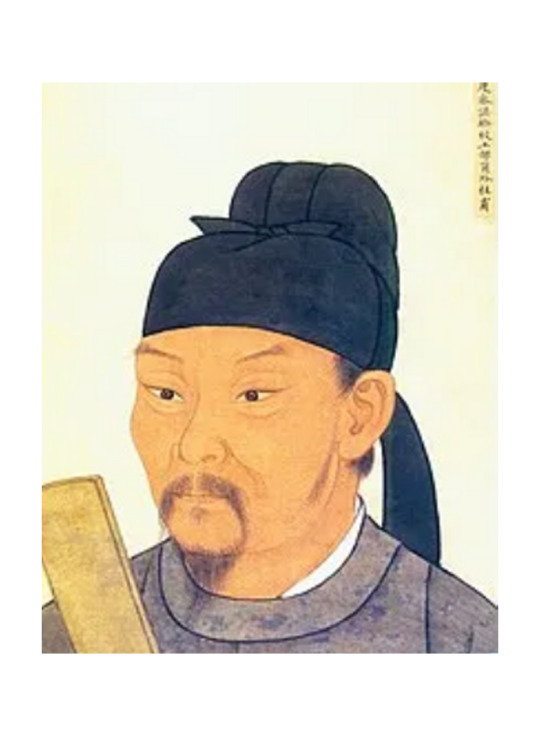
1 note
·
View note
Text
Li Bi, from Alchemists, Mediums, and Magicians: Stories of Taoist Mystics
Alchemists, Mediums, and Magicians: Stories of Taoist Mystics is a collection of biographies of 144 historical figures associated with Daoism, compiled under the title Xuanping lu 玄品錄 by daoist Zhang Tianyu 張天雨 (1279-1350) and translated by Thomas Cleary.
Li Bi was styled Changyuan. He originally lived in Demon Valley. At the age of seven he knew how to write compositions, and in 728 he was summoned to meet the emperor as an extraordinary child. He was most favored by Zhang Jiuling,(67) who called him his little friend.
When he grew up, he studied widely and became expert in the I Ching. He used to travel around to Mount Song, Mount Hua, and Mount Zhongnan, seeking the spiritual immortals’ art of not dying.
During the Tianbao era [742–755], he went to the imperial establishment and presented Proposal for Restoring the Yellow Emperor’s Nine Cauldrons. The emperor, considering him quick-witted, had him lecture on Lao-tzu. He had a command of the principles and obtained the position of attendant scholar.
When Xiaozong [should be "Suzong": it seems the translator confused 肃 with 萧] assumed the throne at Lingwu in 756, he was making inquiries searching for him when Bi showed up on his own. Once he had interviewed him, the emperor was pleased, having had the successes and failures of the empire set forth to him. He was going to give Bi an official post, but Bi stoutly refused. Instead he asked to be allowed to attend discussions of national affairs as a guest and join the imperial entourage on excursions. Everyone pointed and said, “The priest is the ruler, while the layman is the hermit.” [I think it's a mistranslation of the phrase 衣黃者圣人也 衣白者山人也 - "In the yellow dress - the ruler, in the white dress (i.e. in commoner's clothes) - the hermit."]
Thus the emperor bestowed the gold seal and purple cord of court rank upon him and appointed him minister of war for the Infantry of the Chief Commander, king of Guangping.
The emperor once said, “You wait on the deities above, you are our teacher in the center, and now you judge the infantry of Guangping below. Thus are we, father and son [emperor and king] sustained by the principles of your Way.” Cui Yuan(68) and Li Fuguo(69) were jealous of the closeness and confidence Bi enjoyed. Bi feared there would be trouble and requested retirement on Mount Heng. An imperial decree provided him with a salary of a third-ranked official, presented him with the outfit of a retired gentleman, and prepared a dwelling for him on Mount Lu.
Bi once took a curved pine branch to use as a backrest, calling it “fostering balance.” Later he found one shaped like a dragon, which he presented to the emperor. All around vied to imitate this.
When Daizong became emperor [in 763], he summoned Bi and housed him in the library of Penglai Hall. At first he didn’t eat meat, but since rank was bestowed on him he was forced to eat meat by imperial decree.
When Dezong [r. 780–805] was at the Sanctuary in Service of Heaven, he summoned Bi to his temporary headquarters and appointed him policy adviser. Bi first had a road cut through the mountains to the Triple Gate [sluices of the Yellow River] to facilitate shipping. Because of this effort, he was promoted to minister of rites, then in three years to associate manager of affairs.
The emperor once casually remarked, “Lu Qi(70) was puritanical and outspoken, but he had little learning and could not broaden us with the ancient Way. Everyone pointed out his treachery, but we never noticed.”
Bi replied, “Had Your Majesty been able to sense Qi’s evil, how could the troubles of the Jianzhong era(71) have occurred? Li Kui(72) combined the foreign commanders of Chinese armies, while Yan Zhen-qing(73) used Xilie. The damage done to longstanding benevolence and goodwill was great indeed.
“Also, Yang Yan(74) was condemned, though not executed; Lu Qi brought about his downfall and made Guan Bo(75) minister. When Li Huaiguang(76) became successful, Lu Qi goaded him into revolt. This is deceiving heaven.”
The emperor said, “What you say happened, true enough, but you must know what Sang Damo(77) said about the chaos of the Jianzhong era, that it was destined to be so?”
Bi replied, “So-called destiny is something said after the fact. Leaders make destiny; they shouldn’t plead destiny. If you plead destiny, then there’s no rewarding good and no punishing evil!”
The emperor said, “I’ll try not to say ‘destiny’ anymore.”
Shortly he was made a scholar of the Library Honoring Literature, working on national history. Bi requested that the first day of the cycle of the second lunar month be made the Day of Harmony in the Center(78) instead of the last day of the lunar cycle of the first month and that on that occasion the great ministers be given royal relative residence rulers, signifying the sizing up of bureaucrats. He presented a book on agriculture to teach basic production. The emperor was very pleased and issued an order making the second day of the second month, the third day of the third month, and the ninth day of the ninth month three official holidays, when everyone was to be given a bonus of a string of a thousand cash and invited to a banquet.
In the eighth month of 788, the sun eclipsed the two stars associated with literature and culture. Bi said, “Those stars govern maps and books; among the great ministers there will be someone aggrieved. Since I’m both a managing minister and a scholar, it must be me.” The next year, as it turned out, he died.
Bi had free access to the imperial palace, and he worked for four emperors, so he was the object of the jealousy of crafty sycophants numerous times, yet he always escaped by his wits. Moreover, time and again there were factional plots, of which he was able to alert the emperor, and he also improved and enlightened government himself. The restoration of the two capitals praised by historian Liu Bi was due in large part to the planning of Li Bi; his contribution was even greater than Lu Lian’s(79) and Fan Li’s.
Footnotes:
67. Zhang Jiuling (678–740) was a scholar and poet who held a number of high positions under the Tang dynasty, including director of the Secretariat and grand councillor.
68. Cui Yuan was a regional inspector and officer of the Secretariat under Emperor Suzong (r. 756–762).
69. Li Fuguo (704–762) was a eunuch who held high offices in the department of the military under Emperor Suzong.
70. Lu Qi was prime minister under Emperor Dezong, who is faulted for judging people on appearances.
71. This refers to a rebellion of regional authorities. The Jianzhong era lasted from 780 to 784.
72. Li Kui (711–784) held numerous offices under the Tang dynasty, including commissioner for entry into alliance with Tufan. Tufan was a Tibetan state considered a major threat to Tang dynasty China.
73. Yan Zhenqing (709–785) commanded several successful battles against the rebel An Lushan and served in a number of posts under the Tang dynasty, including minister of works and minister of justice. When Li Xilie rebelled, Lu Qi sent Yan to negotiate a surrender, intending to encompass Yan’s death. Yan stood up to Li’s threats and won the latter’s respect. Yan was later assassinated.
74. Yang Yan (727–781) was briefly a minister of state for Emperor Dezong. He is noted for reforming the tax system.
75. Guan Bo held many posts under the Tang dynasty. He is said to have been promoted for prime minister by Lu Qi because the latter considered him easy to control.
76. A regional inspector.
77. A famous prognosticator.
78. On this occasion the emperor customarily gave a banquet for the ministers of state.
79. That is, Lu Zhonglian.
23 notes
·
View notes
Photo
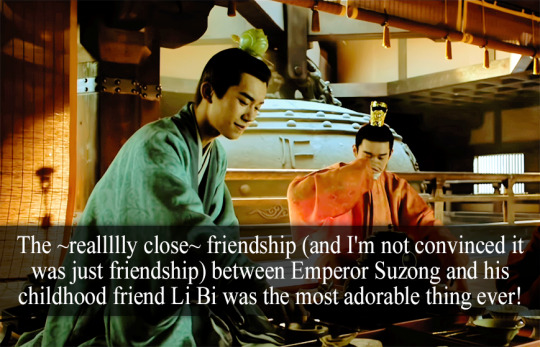
“The ~reallllly close~ friendship (and I'm not convinced it was just friendship) between Emperor Suzong and his childhood friend Li Bi was the most adorable thing ever!” - Submitted by Anonymous
10 notes
·
View notes
Text
Rise of Sixteen States: 304
This year there were many affairs.
Liu Yuan declares himself King of Han.
Li Xiong declares himself King of Chengdu
22 February 304 – 10 February 305
(Jin's 1st Year of Yongxing)
(Han's 1st Year of Yuanxi)
(Chengdu's 1st Year of Jianxing)
3rd Month, wushen [1 May], used the King of Chengdu, Ying as August Brother-Heir and Commander-in-Chief of All Army Affairs in the Centre and Outside, and Assisting Chancellor.
7th Month, bingshen, New Moon [17 August], the General of the Guards of the Right, Chen Zhen, used a decree summoning the hundred companions to enter within the hall, and following that directed troops to punish the King of Chengdu, Ying.
On jihai [20 August], the Minister over the Masses, Wang Rong, the King of Donghai, Yue, and others served the Emperor on a northern campaign. They arrived at Anyang with a multitude of 100 000. Ying dispatched his general Shi Chao to resist them in battle.
On jiwei [9 September], the Six Armies were defeated at Dangyin. Arrows reached the Driving Carriage, the hundred officials divided and scattered. The Emperor that evening favoured Ying's chariot, the next day he favoured Ye.
8th Month [16 September – 15 October], the General who Calms the North, Wang Jun, dispatched Wuwan cavalry to attack the King of Chengdu at Ye, greatly routing him. Ying drove with the Emperor in a single chariot to flee to Luoyang.
11th Month, yiwei [14 December], Zhang Fang coerced the Emperor to favour Chang'an.
The King of Hejian, Yong, led public officials and 30 000 infantry and cavalry to welcome [the Emperor] at Bashang.
(Liu Yuan)
The King of Chendu, Ying, became August Brother-Heir. He used Yuan as Colonel of Garrison Cavalry to the Brother-Heir. Emperor Hui attacked Ying, and stayed at Dangyin. Ying made use of Yuan as General who Assists the State and Commander-in-Chief of the Defence Affairs of the Northern City. When Emperor Hui had been defeated, he used Yuan as General of the Best of the Army, ennobled as Earl of Lunu. Soon after, the Inspector of Bing province, the Duke of Dongying, Teng, and the General who Calms the North and Inspector of You province, Wang Jun, raised troops to attack Ying. Ying's host fought and was defeated. Yuan spoke to Ying, saying:
Now the two garrisons trample on restraint, with a multitude exceeding 100 000. [I] fear we will not be able to manage them with the personal guards and the nearby commanderies' gentlemen and people. Yuan will, Your Highness, return to explain to the Five Sections, assemble and gather a righteous multitude, and thereby hasten to the state's difficulties.
Ying said:
The multitudes of the Five Sections, can they protect and set out already or not? Allowing for you being able to send them out, the Xianbei and Wuhuan are strong and quick like the wind and clouds. How easily can it be done? I wish to serve the Driving Carriage and return to Luoyang, and avoid their spear points, calmly summon Under Heaven to arms, and govern them according to their opposition or loyalty. Lord, what are your thoughts?
Yuan said:
Your Highness is the son of the Martial August Emperor, and has special merits in the royal house. Your power and kindness shine in harmony, the Four Sea's reverent wind. Who would not consider to lose their lives and throw down their bodies for Your Highness? What is the difficulty in sending them out! Wang Jun is an upstart son and Dongying a distant cousin, how could they contend equally with Your Highness?
If Your Highness goes out alone from the Ye palace, and shows weakness to people, is it possible then to arrive in Luoyang? Suppose you reach Luoyang, power and authority will not be restored to Your Highness. A paper calling to arms is a foot-long letter, who will the person be who receives it!
Moreover the Eastern Hu's courage does not exceed the Five Sections. [I] wish Your Highness would encourage and console the multitude soldiers, calming them down and thereby quell them. [I] will, Your Highness, use two sections to destroy Dongying and three sections to put on display Wang Jun. You can point to the day when the heads of the two upstarts will be hanging up.
Ying was pleased and designated Yuan as Northern Chanyu, Assisting the Army Affairs of the Imperial Chancellor. Yuan arrived at Zuoguocheng. Liu Xuan and others elevated him to the title of Great Chanyu. Within twenty days the multitude was soon 50 000. He set his capital at Lishi. He dispatched the Yulu King of the Left, Hong, to lead 5 000 elite cavalry and meet up with Ying's general Wang Cui and resist the Duke of Dongying, Teng. But Cui had already been defeated by Teng, so Hong returned back with nothing done.
Wang Jun sent General Qi Hong to lead Xianbei and attack Ye. Ying was defeated, and held onto the Son of Heaven to run south to Luoyang. Yuan heard Ying had left Ye, he sighed and said:
Ying did not employ my words, on the contrary he is himself running from disaster. He truly has menial talents. However as I and him had words, I cannot but aid him.
Hence he instructed the Yulu King of the Right, Liu Jing, and the Dulu King of the Left, Liu Yannian, and others to lead 20 000 infantry and cavalry, and commanded them to punish the Xianbei. Liu Xuan and others firmly remonstrated, saying:
Jin is without the Way, slaves and lackeys govern us. Therefore the Worthy King of the Right's fierceness does not surpass his anger. Just now Jin's guide ropes are not spread. [If] the great affair is not followed through, the Worthy of the Right will smear [himself] with earth, to the Chanyu's shame.
Now in the Sima clan, father and son, elder and younger brother, are themselves [chopping] each other [like] fish meat, this is Heaven casting aside Jin's virtue and conferring it on us. [If] the Chanyu stores up virtue in his body, and is submitted to by the people of Jin, [he] soon will raise up our nation and tribe and restore the patrimony of Huhanxie. The Xianbei and Wuhuan are of our manners and type, and could be used as helpers, why would [we] resist them and aid [our] foes!
Now Heaven is acting through us and cannot be disobeyed. To disobey Heaven is not auspicious, to go against the multitudes is not helpful. [He who when] Heaven gives does not take, will in turn receive his calamity. [I] wish the Chanyu would not doubt.
Yuan said:
Good. [I] will be raising up the hill to the pinnacle mound, why would I make a hillock! As for Emperors and Kings, when where they regular? Yu the Great was born among the Western Rong, King Wen was born among the eastern Yu. Looking back, they were conferred for virtue, that was all. Now [I] see a multitude of more than 100 000, and anyone of us is a match for ten of the Jin. To strike the march and destroy chaotic Jin is like snapping deadwood, that is all. At best I can complete the legacy of Gao of Han, at worst I will be no less than the Wei clan. How is Huhanxie a sufficient course of action!
However, the people of Jin are not necessarily similar to us. Han had Under Heaven for many generations, kindness and virtue connection to the population's hearts. Thus though Zhaolie [lived] rough and rugged in the lands of a single province, he was yet able contend at an equal level Under Heaven. I am also a sister's child of the Han clan, sworn to be elder and younger brothers. When the older brother perishes, the younger carries on. Can we not do likewise? Now moreover, I can raise up Han, posthumously honour the Later Ruler, and thereby comfort the populace's expectations.
Xuan and others touched head to ground, saying:
[They] are not reaching up [to you].
1st Year of Yuanxi [304 AD], he moved to Zuoguocheng. The Jin people who [came from] the east to adhere were several ten thousand. Xuan and others sent up [to assume] the venerated title. Yuan said:
Now the Jin clan still exist, the Four Regions are not yet settled. [We] can look up to and honour the Exalted August's first regulations, and moreover designate [me] King of Han [while] for the moment delaying the tile of August Emperor. [When I] hear the cosmos is mixed into one [I] will once more discuss it.
10th Month [14 November – 10 December], he had an altar in the southern suburbs, and falsely ranked as King of Han. He sent down an order, saying:
Formerly our Grand Founder [taizu], the Exalted [gao] August Emperor used his divine martial ability to follow expectations, and broadly began the great patrimony. The Grand Ancestor [taizong], the Filial and Civil [xiaowen] August Emperor gave weight to using enlightened kindness, peace and prosperity was the Way of Han. The Generational Ancestor [shizong], the Filial and Martiaizul [xiaowu] August Emperor expanded the territory and repelled the yi, the territory exceeding the days of Tang. The Middle Ancestor [zhongzong], the Filial and Propagating [xiaoxuan] August Emperor, sought and lifted up the capable and outstanding, many scholars filled the court.
Hence the Way of our founder and ancestors strode pass the Three Kings, their achievements exalted as the Five Emperors. For that reason the foretold years were many times the Xia and Shang's, the foretold generations exceeded the Ji clan. But Yuan and Cheng had many crimes, Ai and Ping were briefly blessed. The traitorous subject Wang Mang overflowed Heaven and usurped disobediently.
Our Generational Founder [shizu], the Brilliant and Martial [guangwu] August Emperor was expansively endowed with sagely martial ability. He immensely restored the vast foundation, worshipped Han matched with Heaven, and did not neglect old matters, so that the Three Luminaries' obscurity were yet restored to clarity, the Three Receptacles' darkness were yet restored to visibility. The Manifesting Ancestor [xianzong], the Filial and Enlightened [xiaoming] August Emperor, and the Solemn Ancestor [suzong], the Filial and Articulating [xiaozhang] August Emperor, amassed eras, the blazing light twice revealed.
From He and An and afterwards, the august guide-ropes gradually decayed, Heaven's pace was hard and difficult, the state's government again and again cut off. The Yellow Turban seas boiled in the Nine Provinces, the crowd of eunuchs' poison flowed in the Four Seas. Dong Zhuo following that indulged his careless heedlessness, Cao Cao, father and son, fell rebels, were soon after.
For that reason Xiaomin let go and put aside the ten thousand states. Zhaolie strayed beyond Min and Shu, hoping the stoppage in the end would have exaltation, returning the carriage box to the old capital. How to assess Heaven not regretting the calamity, the Later Emperor was embarrassed and humiliated.
Since the altars of soil and grain were lost and ceased, the ancestral temple have not had blood to eat for forty years until this point. Now Heaven is coaxing its inner self, regretting the calamity to August Han, and making the Sima clan, father and son, elder and younger brother, repeatedly break and wipe out each other. The numerous multitudes are in the mud and soot, scattering to denounce and accuse.
This Orphan is now all at once pushed forward by the crowd of excellencies, to carry on offering to the Three Founders' legacy. Looking at [my] current crippled ignorance, [I] shiver in fear for collapsing in a shallow grave. However, as the great shame is not yet wiped away, the altars of soil and grain are without a host, with gall in the mouth and the roost cold, [I] will strive to follow the crowd's opinion.
He changed Jin's 1st Year of Yongxing to be the 1st Year of Yuanxi [“Inaugural Radiance”], there was a great amnesty Under Heaven. He posthumously venerated Liu Shan as the Filial and Cherished [xiaohuai] August Emperor. He established Gaozu of Han and below, three Founders and five Ancestors, as divine rules and worshipped them. He established his wife, Ms. Huyan as Queen, set up the hundred officials, and used the Worthy King of the Right, Xuan, as Imperial Chancellor, Cui You as Imperial Clerk Grandee, the Yulu King of the Left, Hong, as Grand Commandant, Fan Long as Great Herald, Zhu Ji as Grand Master of Ceremonies, Cui Yizhi of Shangdang and Chen Yuanda of the Rear Section both as Gentlemen of the Yellow Gates, his clan-child Yao as General who Establishes the Martial, the remainder were designated and conferred each proportionally. You firmly declined and did not go.
12th Month [12 January 305 – 3 February], the Duke of Dongying, Teng, sent General Nie Xuan to chastise him, they fought at Daling. Xuan's host achieved defeat. Teng was afraid, he led more than 20 000 households of Bing province to go down East of the Mountain. Thereupon [the people who] lived there were robbed. Yuan dispatched his General who Establishes the Martial, Liu Yao, to rob Taiyuan, Xuanshi, Zhunliu, Zhangzi and Zhongdu, all were lost to him.
He also dispatched the General of the Best of the Army, Qiao Xi, to rob Xihe. The Prefect of Jiexu, Jia Hun resisted steadfastly and did not surrender, saying:
I am a defender of Jin, [if I am] not able to maintain it, why cautiously seek to live therefore serving thieves and miscreants? How could I face accordingly to watch and breath in the world!
Xi was angry, apprehended and wanted to kill him. Xi's general Yin Song said:
[If] the General saves him, [he can] thereby convince [him] to serve you, Lord.
Xi did not listen and thereupon murdered him. Jia Hun's wife, Ms. Zong, had a beautiful figure and Xi desired to take her. Ms. Zong reviled him, saying:
Slave of the Tuge, how can you murder a person's husband then desire to assign [her] without decorum, how is this to you? Why do you not hurry and kill me!
Then she raised her head to Heaven and greatly wept. Xi thereupon murdered her. At the time she was (more than) 20 years old. Yuan heard about it, and greatly angered said:
If it is the Way of Heaven to be perceptive, the view of Qiao Xi has sown seeds!
When the pursuers returned, he demoted his salary four grades, collected Hun's corpse and buried it.
(Cui You)
Cui You, courtesy name Zixiang, was a native Shangdang. As young he was fond of studying, he was discerning and enlightened in the Ruist methods, tranquil, peaceful, humble and withdrawn. From young to old his mouth not once spoke about wealth and profit. At the end of Wei, he was examined as Filial and Upright, and appointed Retainer of the Chancellor's Office. He set out to be Chief of Dichi, he was very kind in government affairs. He retired due to illness, and thereupon was disabled and sick.
At the beginning of Taishi [265 – 274], Emperor Wu favoured the succession from Emperor Wen's old office companions and staff, and attended on the family to designate a Palace Gentleman. Aged more than 70, he still esteemed studying and did not tire. He compiled a Chart of Mouring Clothes, which has come down through the ages. He passed on at home, at the time he was 93 years old.
(Liu Cong)
Liu Cong, courtesy name Xuanming, also named Zai, was Yuan's 4thson. His motherwas named Lady Zhang.Earlier, when she was pregnant with Cong, Lady Zhang dreamt the sun enter her breast. She woke up and told Yuan. Yuan said:
This is a good omen, take care not to talk of it.
Fifteen months from that then she gave birth to Cong, at night there was an exceptional white light. The shape of his body was not usual. In his left ear there was a single white hair, more than two chi long with considerable shine and lustre. As a young child he was yet intelligent and aware and fond of studying, the Broad Scholar Zhu Ji greatly marvelled at him. At the age of fourteen, he delved thoroughly into the the classics and histories, and even more so the assembled words of the hundred schools. In Sun and Wu's Principles of War there was nothing he did not completely understand.
He was skilled with the draft and clerical scripts, and good with composing texts. He displayed and expressed his deepest feelings in more than a hundred chapters of poetry, and more than fifty chapters of rhapsodies and hymns. At fifteen he practised striking and stabbing. He had ape arms and was good at shooting, he could bend a bow 300 jin strong, was strong in body, valiant and agile, ahead and beyond the times. Wang Hun of Taiyuan saw and was pleased with him. He spoke to Yuan, saying:
This boy cannot be measured by me.
As a youth he drifted to the Imperial City, there were nobody of the famous scholars he did not communicate and connect with. Yue Guang and Zhang Hua particularly marvelled at him.
Jin's Grand Warden of Xinxing, Guo Yi, nominated him has Master of Accounts, he served accordingly in the commandery's affairs. He was recommended good and supportive, and entered to became Marshal of Detached Section of Valiant Cavalry. The King of Qi, Jiong, used him as Palace Commandant of State. He set out to be Marshal of the Left Section, and soon after amassed to move to Chief Commandant of the Right Section. He was good at consoling and connected, there were none of the Five Section's prominent and honoured who did not revert to him. The Grand Steward, the King of Hejian, Yong, petitioned him to be Commander of the Palace Gentlemen of the Red Sand.
Cong, since Yuan was at Ye, and he feared he would be murdered by the King of Chengdu, Ying, he absconded and ran to Ying. Ying was extremely pleased, and designated him General who Amasses Crossbows of the Right, Assisting the Battle Affairs of the Vanguards. When Yuan became Chanyu of the North, he was established as Worthy King of the Right, and accompanied to turn back to the Right Section. When he was enthroned as Great Chanyu, he changed his designation to Lulu King.
(Liu Yao)
Liu Yao, courtesy name Yongming, was Yuan's clan-child. He was orphaned young, and was nurtured by Yuan. As a youth, he was yet perceptive and intelligent, and had unusual measures. Aged eight sui, he accompanied Yuan to hunt in the Western Mountains, when they came across rain, and stopped beneath a tree. Suddenly, thunder shook near the tree. None of the people did not fall over and lie down, Yao in spirit and colour was like himself. Yuan was amazed by him, and said:
This is my family's thousand li colt, older cousin is not gone!
He was nine chi, three cun tall, his hands hang down past the knees. When he was born, his eyebrows were white and his eyes had a red glow. His beard and whiskers did not exceed a hundred roots, but all were five chi long. He by nature lifted up and let drop the high and brilliant, and was not among the crowd of the multitudes.
He read books with a mind towards a broad overlook, and did not concentrate on pondering chapters and verses. He was good at composing text and was skilled with the draft and clerical scripts. His gallantry and martial ability was beyond other people. Iron one cun thick he shot and pierced, at the time it was declared to be a godly shot. He particularly fond of military books and could recite roughly all from memory. He often made light of and ridiculed Wu and Deng, but compared himself with Yue Yi, Xiao, and Cao. At the time people did not acknowledge him, only Cong said:
Yongming is in the class of Shizu and Wu of Wei, how are some Excellencies worth mention!
As a youth he drifted to Luoyang, was implicated in an affair and was to be executed. Therefore he absconded with Cao Xun to run to Liu Sui. Sui hid him in a book cabinet, carried, and sent him off to Wang Zhong. Zhong sent him off to Chaoxian. For the remainder of the year, he was starving and hard-pressed. Thereupon he altered his family and personal name, and as a retainer became a county soldier. The Prefect of Chaoxian, Cui Yue, saw and was amazed with him. He gave him clothes and food, his charity and regard was very substantial. Cao Xun, though he was in the midst of a difficult situation, served Yao with the rites of lord and subject. Yao was very gracious to him. Later there happened to be an amnesty, and he was free to return home.
He himself, since his appearance and substance was different from the multitudes, and feared he would not be tolerated during the era, once lived in hiding in the mountains of Guancen, using a qin zither and books to amuse himself. In the middle of the night, suddenly there were two servant boys who entered, knelt, and said:
The King of Guancen sends his young subjects to offer his respects to the August Emperor of Zhao.
They presented a single edged sword, put it in front of him, bowed twice, and departed. He used a torch to look at it. The sword was two chi long, the shine and polish was not ordinary, red jade made up the sheath, on the back side there was an inscription which said:
The godly sword holds sway, removes the multitudes' poison.
Yao thereupon wore it. The sword followed the four seasons and altered to have the five colours.
(Shi Le)
1st Year of Yongxing [304 AD], the King of Chengdu, Ying, defeated the Driving Carriage at Dangyin, and pressured the Emperor to go to the Ye Palace. Wang Jun, since Ying had secluded and humiliated the Son of Heaven, sent Xianbei to strike him. Ying was afraid, clasped Emperor Hui and ran south to Luoyang. The Emperor then was pressured by Zhang Fang, and moved to Chang'an. East of the Passes troops were rising up, all using executing Ying as their name. The King of Hejian, Yong, feared the abundance of the eastern host, and wished to bring together and placate the Eastern Xia. He therefore memorialised to debate deposing Ying.
This Year, Liu Yuan declared himself King of Han at Liting.
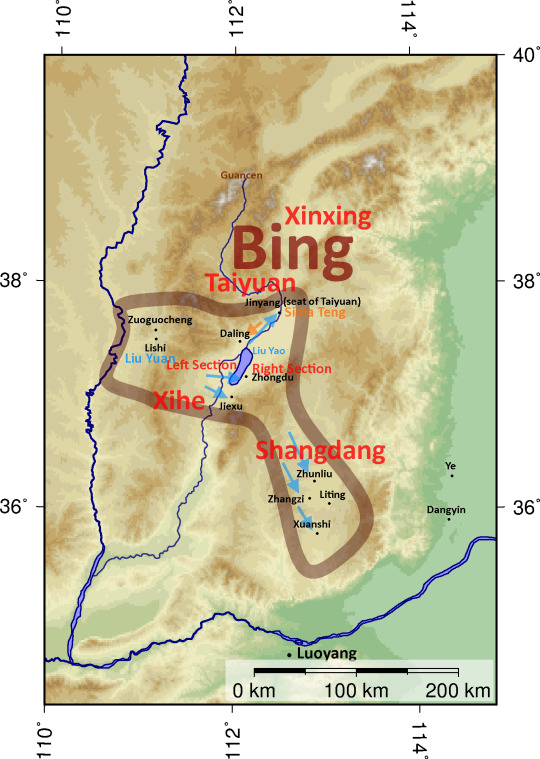
(Li Xiong)
1st Year of Jianxing, Spring, 1st Month [22 February – 22 March), Luo Shang arrived at Jiangyang. The Minister of the Army, Xin Bao, went to Luo to show the circumstances. A written decree gave authority to control Badong, Ba commandery, and Fuling commanderies, to supply his army taxes.
(JS066: At the time the Inspector of Yi province, Luo Shang, was defeated by Li Te. He dispatched envoys to announce the urgency and request provisions. Hong circulated a letter to supply and provide. But the provincial office's mainstays and guidelines, as the transport roads were isolated and remote, and the civil and military officials wanting and weary, desired to use Lingling to alone transport 5 000 hu of rice to give to Shang. Hong said:
You Lords have not yet thought about it, that is all. Under Heaven is a single family, this and that are not different. If I today provide for him, then there is no anxiety in looking west.
Thereupon he used 30 000 hu of rice from Lingling to provide for him. Shang relied on it to strengthen himself.)
Winter, 10thMonth [14 November – 13 December], the various generals firmly requested Xiong accede to the venerated rank. (HYGZ: Yang Bao and Yang Bao together urged Xiong to declare himself King.) Hence he presumptuously declared himself King of Chengdu, with an amnesty within his territories, and changed the inaugural to Jianxing [“Establishing the Rise”]. He removed the Jin laws, and condensed the law into seven chapters.
He used his junior uncle Xiang# as Grand Tutor, his commoner-born older brother Shi as Grand Guardian, the Smashing Charges Li Li as Grand Commandant, his junior cousin, the Establishing Domination Li Yun as Minister over the Masses, the Supports the Army Li Huang as Minister of Works, the Talented Officials Li Guo as Grand Steward, Yan Shi as Prefect of the Masters of Writing, Yang Bao as Supervisor, Yang Fa as Palace Attendant, Yang Gui as Master of Writing, Yang Hong as Inspector of Yi province, Xu Yu as Garrisons the South, Wang Da as Army Teacher. For the remaining civil and military officials, he designated and conferred each proportionally.
He retroactively venerated his great grandson Hu as the Mighty [huan] Duke of Ba commandery, his grandfather Mu as the Accomplished [xiang] King of Longxi, his father Te as the Luminous [jing] King, his mother Ms. Luo as Queen Dowager. His senior uncle Fu as the Ardent [lie] King of Qi, his middle uncle Xiang as the Martial [wu] King of Liang#, his middle uncle Liu as the Civil [wen] King of Qin, his older brother Dang as the Strong and Civil [zhuangwen] Duke of Guanghan.
Winter, Shang relocated to station at Ba commandery. He dispatched an army to plunder within Shu. He beheaded Xiong's granduncle Ran, and captured Xiang#'s wife Zan, his son Shou, and his brothers.
12th Month [12 January – 10 February], Xiong's Grand Commandant Li Li invaded Hanzhong, and killed the Battle Leader Zhao Min.
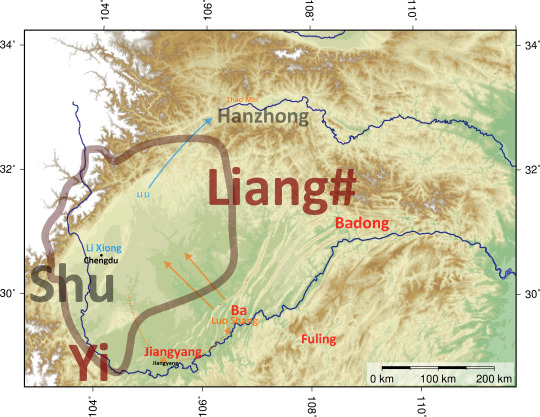
(Zhang Gui)
Reaching the difficulties of the two Kings of Hejian and Chengdu, he dispatched 3 000 troops to proceed east to the Imperial City.
Earlier, at the end of Han, a man of Jincheng, Yang Chengyuan, killed the Grand Warden in rebellion. A man of the commandery, Feng Zhong, attended to the corpse, shouting and weeping. He vomited blood and died.
A man of Zhangye, Wu Yong, was appointed by the Colonel who Protects the Qiang, Ma Xian. Later he was on the staff of the Grand Commandant, Pang Can. Can and Xian defamed each other with crimes that merited death. Each pulled on Yong as evidence. Yong planned and reasoned without the two accepting responsibility, and thereupon he cut his own throat and died. Can and Xian were ashamed and remorseful, and themselves made peace and cleared out with each other.
Gui in both cases sacrificed at the their tombs and honoured their sons and grandsons.
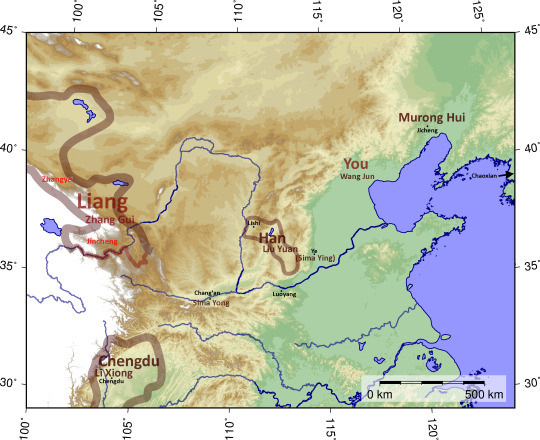
13 notes
·
View notes
Text
Gao Shi: One day your fame will spread far and wide
莫愁前路無知己,天下誰人不識君。
Forge ahead with no fear of solitude, for across the lands your fame spread far and wide
It was a cold winter. It was here 2 good friends parted. Looking at the gloomy sky and their uncertain futures, Gao Shi wrote this poem.
The exact year of this poem was not known. Many attributed it to the year 747. If so, he would be at least in his forties [1].
For the past forty or so years, Gao Shi repeatedly tried to gain a decent official position, be it through taking part in the Imperial Examinations or attempting to offer his service to influential military officials. He was from the prominent Bohai Gao clan, his grandfather Gao Kan was a famous general who fought bravely in the Goguryeo wars. Perhaps Gao Shi wanted to be just like him. Alas, none of his efforts paid off [2].
But all this travelling did allowed him to meet many people. Between the year 744 to 745, Gao Shi travelled together with 2 famous poets, Li Bai and Du Fu [3]. They would go on to write numerous poems about this extremely enjoyable journey, many of which still available today.
Perhaps that would be it, a life spent wandering and writing poems.
Or not.
Around the year 750, he was recommended by Zhang Jiugao to take part in the imperial examination again. This time round he managed to pass and was given an official position in Fengqiu County [4].
However, he didn’t like the job at all. He eventually resigned and with the recommendation from his friend Tian Liangqiu, he met the famous Tang general Geshu Han, who recommended him to the court for the positions of Sergeant of the Left Xiao Guard and Secretariat of Longyou Jiedushi (Which is Geshu Han himself) [5]. It was here Gao Shi followed Geshu Han’s troops on numerous offenses and wrote poems praising their victories.
Unfortunately, happy times didn’t last long. The An Lushan rebellion soon came (in year 755). Even though Gao Shi defended the Tong pass together with Geshu Han, they were eventually defeated. Geshu Han was killed, while Gao Shi managed to catch up with the fleeing Emperor Xuanzong in Hechi Commandery [6].
Gao Shi promptly advised Xuanzong, and was eventually appointed as Grand Master of Remonstrance [7].
Soon, Prince of Yong rebelled (year 757). Emperor Suzong summoned Gao Shi to discuss the issue. Gao Shi explained in detail to him that the rebellion was bound to fail, and was later on appointed as Huainan Jiedushi, amongst other titles, to defeat the rebels [8]. At almost 60 years old, he became someone just like his grandfather.
Amidst the chaos, an old friend was also involved. Li Bai served under the Prince of Yong, and wrote many poems for him. After his defeat, Li Bai was jailed for involvements with the rebellion, knowing about Gao Shi’s influence as one of the leading generals, he wrote a poem to seek help from Gao Shi [9]. Gao Shi, however , did not reply to or help out Li Bai in any way. Even when one is in a high-ranking positions, one isn’t truly free in whatever he does, nor would he be capable of resolving all issues, especially in regards to revolts and rebellions. The two of them would never have any contact again, and Li Bai died a few years later (762). In the past decade, so much has happened. Perhaps some things were just never the same again.
As if to prove this point that Gao Shi was still very much powerless in a lot of things, he was soon demoted after coming into conflict with Li Fuguo [10].
The last member of the original trio didn’t had it any easier during the chaos. After becoming homeless and enduring numerous hardships as he wandered across half of China, Du Fu finally arrived at Jiannan Circuit, where Gao Shi was also serving as an Inspector for Shu and Peng Prefectures under Jiannan Circuit. They would go on to exchange poems, and Gao Shi would also , from time to time, offer aid to the poor poet [11].
In his final years, Gao Shi wrote a poem to Du Fu
今年人日空相憶,明年人日知何處
Today we miss each other dearly, but where will we be tomorrow?
.....
龍鍾還忝二千石,愧爾東西南北人
Old and feeble I still hold my high-ranking position, I can’t help but feel guilty about the sufferings of my friends.
In the year 765, Gao Shi died [12].
Years after his death, when Du Fu chanced upon this poem again, he was reminded of their interactions; from the journeys with him and Li Bai, to the reunion amidst the chaos. After 50 years of wandering and numerous failures, Gao Shi finally managed to achieve his dreams. Du Fu cried, and wrote a poem in remembrance of his old friend [13].
Some people die at 50, but for some, their lives only begin at 50. The poem Gao Shi wrote for his friend could very well be a summary of his life. The original recipient of his poem didn’t leave a prominent mark in history, but for Gao Shi, his fame indeed spread far and wide across the lands, as a poet, as a politician and as a general.
Footnotes
1. The exact year he was born in was not known, with proposals ranging from 700 - 706.
2. Around Year 720, went to Chang’an in search of opportunities, failed. Year 731-734, visited Li Yi, did not get appointed. Year 735, failed Imperial examinations in Chang’an. 《高适年谱诸疑考辨》 孙钦善; 《 高适早期诗歌风格初探 》 路歌
3. 尝从白及高适过汴州 《新唐书·列传第一百二十六》;《高适年谱诸疑考辨》 孙钦善
4. 宋州刺史张九皋奇之出《礼记·礼运》:「大道之行也,天下为公,选贤与能,讲,举有道科中第,调封丘尉 《新唐书·列传第六十八》; 宋州刺史张九皋深奇之,荐举有道科《旧唐书·卷一百一十五》
5. 河西节度哥舒翰见而异之。表为左骁卫兵曹,充翰府掌书记 《旧唐书·卷一百一十五》
6. 禄山乱,召翰讨贼,即拜适左拾遗,转监察御史,佐翰守潼关。翰败.... 天子西幸,适走间道及帝于河池 《新唐书·列传第六十八》
7. 俄迁侍御史,擢谏议大夫 《新唐书·列传第六十八》
8. 上召高适与之谋。适陈江东利害,且言璘必败之状。十二月,置淮南节度使,领广陵等十二郡,以适为之;置淮南西道节度使,领汝南等五郡,以来瞋为之;使与江东节度使韦陟共图璘。《资治通鉴·卷第二百一十九》
9. 《 送张秀才谒高中丞 》
10. 兵罢,李辅国恶适敢言,短于上前,乃左授太子少詹事 《旧唐书·卷一百一十五》
11. 《杜甫与高适蜀中关系新论》 辛晓娟.
12. 永泰元年正月卒,赠礼部尚书,谥曰忠。 《旧唐书·卷一百一十五》
13. 《 追酬故高蜀州人日见寄 》
8 notes
·
View notes
Text
Random Stuff #6: the Characters of “The Longest Day in Chang'an” that Really Existed (Part 1)
(Part 2 Here)
About a month ago, I finished The Longest Day in Chang'an, a period cdrama set in mid-Tang dynasty, 744 AD to be exact. Since it is a period drama, there's bound to be characters adopted from history, so here's a list of all the characters (that I could find) who actually existed:
Zhang Xiaojing (张小敬):
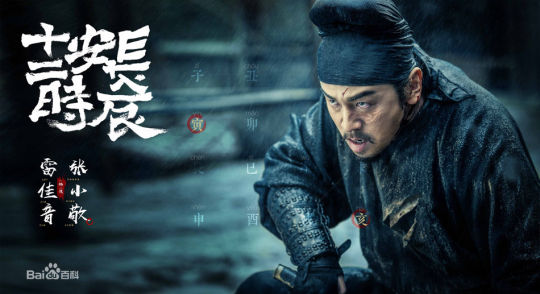
This one came as quite a surprise, because in traditional Chinese historiography, only people who significantly impact an era get to be recorded, but then the name "Zhang Xiaojing" appeared in one line of The Deeds of An Lushan (《安祿山事蹟》), by Yao Runeng of all people: "cavalryman Zhang Xiaojing shot Yang Guozhong off his horse, then proceeded to decapitate and mutilate his body". Considering that Yang Guozhong (楊國忠) was regarded as a "treacherous" chancellor and this was roughly a decade later from when the story took place, when the An Shi Rebellion was in full swing and Chang'an had fallen to rebel forces, this almost vigilante-like "Zhang Xiaojing" seems to be the historical original that inspired the character.
Li Bi (李必)/ historical: Li Bi (李泌):
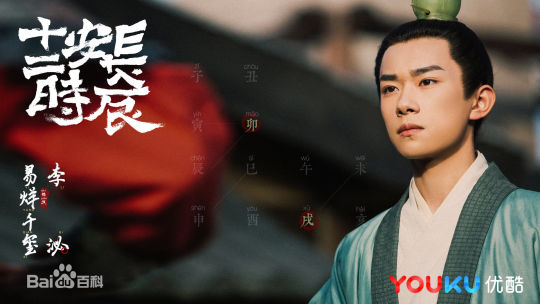
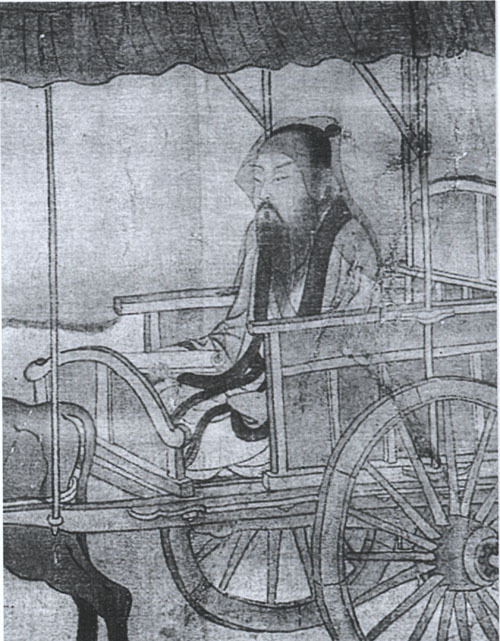
In stark contrast with the "obscure hero" Zhang Xiaojing, Li Bi was very much famous. Why? Dude was an important adviser to 3 different Tang emperors, basically a chancellor without an official title, and actually became a chancellor for the third emperor. For that reason, he has 2 official biographies in The Old Book of Tang (《舊唐書》) and The New Book of Tang (《新唐書》), some records in Zizhi Tongjian (《資治通鑑》), a rather fantastic account by his son while his son was on death row (《鄴侯家傳》; surviving version: 《鄴侯外傳》), and an English Wikipedia page. On a side note about the Wikipedia page: it says Li Bi was a "controversial figure", but never quite pointed out why. It's because in historical sources, people praised Li Bi for his abilities, but often add how he was a Daoist and “loved to talk about the supernatural”. This wasn’t surprising, since Daoist ideas were often looked down upon by Confucian scholars. Despite getting unfairly judged for his personal beliefs, Li Bi was still a brilliant strategist, involved in everything from war to politics to foreign policy.
He Zhizheng (何执正)/ historical: He Zhizhang (賀知章):
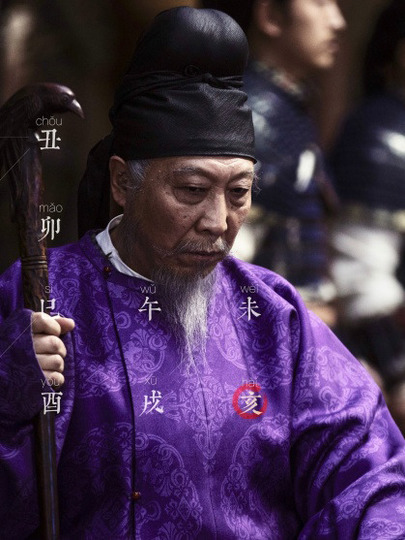

At first people only suspected that He Zhizheng was He Zhizhang, because of how similar the names sounded, and this was 100% confirmed when the drama attributed the poem lines "Who knows who the tailor is, who’s cut your leaves so fine? It’s/ The vernal winds past February, sharp as the scissors’ blades" (不知細葉誰裁出 二月春風似剪刀; translation courtesy of Andrew W.F. Wong) to him. The lines come from the poem “An Ode to the Willow” (《詠柳》) by He Zhizhang, known by most Chinese people in China due to it being in the elementary school literature textbooks. He was definitely more famous for being a poet than for being a scholar-official. Unfortunately, only 19 of his poems survived to the present day. He Zhizhang has official biographies in Old Book of Tang (under the “scholars” section), and New Book of Tang (under the “secluded literati” section). He also has an English Wikipedia page.
Lin Jiulang (林九郎)/ historical: Li Linfu (李林甫):
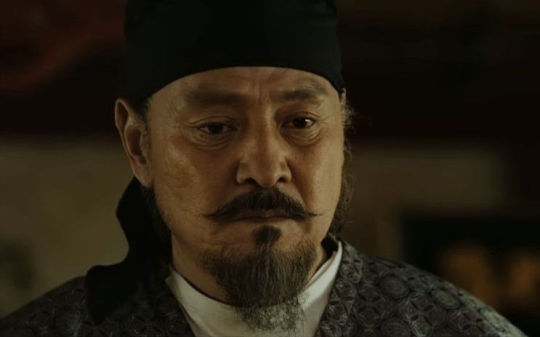
Like the character Lin Jiulang, Li Linfu was also a chancellor (for 19 years!), and arguably just as sleazy and manipulative. As an example, the Crown Prince Li Ying, Prince Li Yao, and Prince Li Ju were killed because of a scheme that he participated in. In the story, the Crown Prince Li Heng was rightfully intimidated by Li Linfu, since Li Linfu caused the death of his brothers. Li Linfu did have a more endearing side: while not busy doing his chancellor day job or concocting schemes, Li Linfu was apparently a pretty good painter. Li Linfu was also a descendant of the royal family, but this wasn’t obvious in the drama, due to the different surname.
Li Linfu had an official biography in Old Book of Tang and a Wikipedia page.
Li Longji (李隆基) (posthumous title: Emperor Xuanzong of Tang):
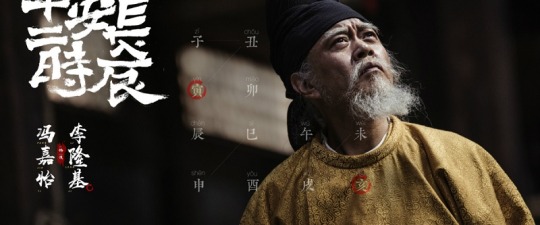

Li Longji was a prominent emperor of the Tang dynasty, so he has a very detailed Wikipedia page, but his reign was significant in other ways too. His reign was simultaneously regarded as a “climax” of the Tang dynasty, and also the start of its decline, marked by the An Shi Rebellion. Since the story took place roughly a decade before the rebellion, smack-dab in the “good days” of the dynasty, it portrayed many of the problems that led to its decline.
After the An Shi Rebellion officially began, Li Longji fled with his court to the mountainous Sichuan when Chang’an fell. Though his son, Li Heng, did eventually take back Chang’an, the city never quite recovered after that.
Li Heng (李亨) (posthumous title: Emperor Suzong of Tang):
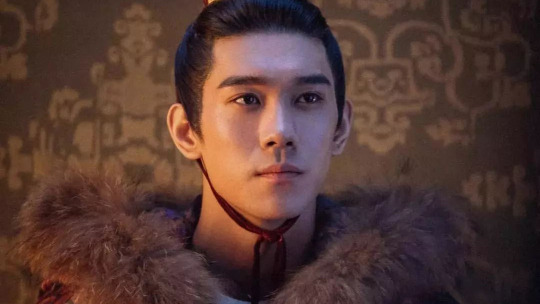

Being another emperor of the Tang dynasty, Li Heng also had a pretty detailed Wikipedia page, so I’m going to relay a fun little (and probably not real?) story between him and Li Bi that came from the aforementioned account by Li Bi’s son’.
After the An Shi Rebellion began, Li Heng went to Ling Wu and went through coronation there to become the emperor. Soon after, he sought out his friend Li Bi for help in putting down the rebellion. Li Bi came and like a few other people, proved to be of great help, so Li Heng was worried about how to reward them for their irreplaceable contribution. Li Heng went to Li Bi one day and asked him what he would want for his reward. Li Bi’s answer was surprisingly simple: “I am a devout Daoist, so I don’t care about worldly rewards of money or political status. I only want to take a nap on Your Majesty’s legs.”
So one day, when Li Bi went to take a nap, Li Heng came to his place, told the servants to leave, and snuck into Li Bi’s bedroom to sit at the edge of the bed. Then he moved Li Bi’s head onto his legs, so Li Bi would have his wish fulfilled.
The above story may have been just a story made up by Li Bi’s son, but the official history texts did mention (in Li Bi’s biography) how Li Heng and Li Bi were such good friends that they always went out together on the same carriage, so hey, there’s a possibility.
175 notes
·
View notes
Link
Quite coincidentally, guess what I’m currently watching? Zhang Bo, Zhou Yiwei, and Qin Junjie; Guangxu, Liang Wenxiu, and Kangxi. All incredibly talented actors, all portraying characters...that are pissing me off right now?
#i guess this means i'm watching the among the best acting of the industry rn?#but ep 22/23 of the pleiades honestly felt rather messy?#guangxu in the pleiades is so stupid i can't rn -_-#like legit suddenly suzong feels like a good ruler#like wtf#oh and on the topic of the pleiades making me think of 欢瑞 dramas#wenxiu freaking brought up kangxi defeating oboi#comparing it to guangxu vs. cixi#like bruh no#not even close#zhang bo#zhou yiwei#qin jun jie#qin junjie#cdrama
2 notes
·
View notes
Photo
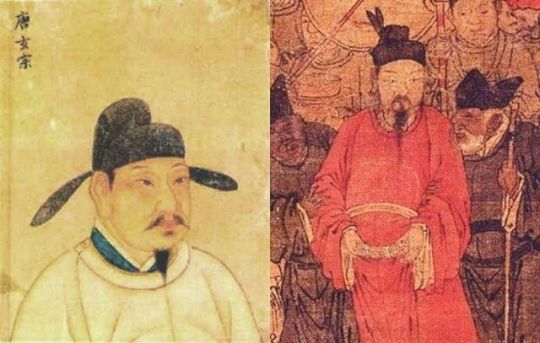
El espeluznante asedio de Suiyang, cuando el canibalismo acabó con más de 20.000 habitantes
La batalla de Suiyang fue un conflicto que tuvo lugar durante la rebelión de An Lushan. Esta insurrección tuvo lugar en la segunda mitad del siglo VIII, en la época de la dinastía Tang. Tras el auge de dicha dinastía, sucedió rápidamente una época de decadencia que desencadenó un golpe de estado orquestado por An Lushan, gobernador de ascendencia sogdiana y turca, quien se autoproclamó emperador fundando la dinastía Yan.
Estando en la cima de poder, el hijo de Lushan, An Qingxu, lo asesinó, tomando el poder. Su objetivo principal fue invadir Suiyang, un punto clave para la dominación de la región.
Los primeros intentos de asedio fueron infructuosos, por lo que el ejército Yan perpetró un par de intentos posteriores. Mientras tanto, las provisiones de los habitantes de Suiyang alcanzaron niveles críticos mientras éstos se preparaban para los enfrentamientos contra los Yan.
Fue entonces, ante la carencia absoluta de algo que llevarse a la boca, cuando las crónicas chinas reseñan el recurso al canibalismo. «Los habitantes entregaron a sus hijos para comer y cocinaron los cadáveres (…) Zhang Xun Sacó a su concubina y la mató delante de sus soldados para alimentarlos» cuentan los libros de Tang, ordenándoles que comieran su carne ante su reticencia, para más tarde hacer lo mismo con sus sirvientes y seguir así con los que no eran combatientes, como los ancianos, las mujeres y los niños.
Es difícil verificar las cifras y condiciones que cita el susodicho libro, que habla de veinte a treinta mil personas devoradas pues buena parte de ellas seguramente corresponderían a los caídos en la lucha o los muertos por causas diversas. Lo verdaderamente sorprendente es que, al parecer, todos aceptaron la terrible iniciativa como un mal necesario, sin rechistar ni intentar organizar algún motín en favor de la rendición.
El caso es que Suiyang cayó finalmente en octubre de ese año y cuando el ejército Yan entró únicamente quedaban cuatrocientos defensores, todos desfallecidos, sin fuerzas ya para hacerles frente.
Con aquella victoria los rebeldes se adueñaron del sur de China durante dos años pero, entretanto, el tiempo ganado por la resistencia de Suiyang y el privarles de auxilio permitió al emperador Suzong contar con recursos para reunir tropas hasta alcanzar un número de ellas suficiente para hacerles frente y contraatacar. Así, cambió la hasta entonces victoriosa marcha de la rebelión Yan y la aplastó definitivamente en el año 763.
61 notes
·
View notes
Photo
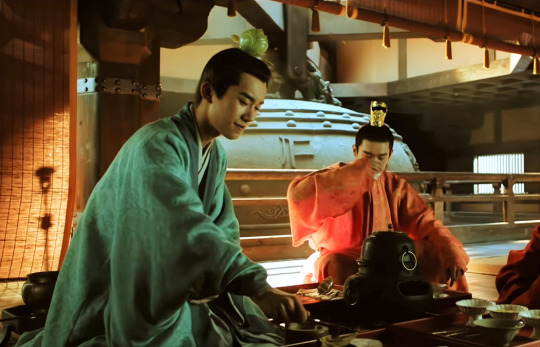
The Longest Day in Chang’an history spam continues (previous posts: 1, 2, 3).
You know, the historical Li Bi and Li Heng (Crown Prince Li Yu in the dorama) were Very, Very Good Friends!
(The information below is mostly from the 218 and 220 vol. of the chronicle Zizhi Tongjiang.)
Li Bi was a childhood friend of prince Li Heng (future Emperor Suzong). Later, after Li Heng was named the crown prince, Li Bi served as his attendant. However, not long before the An Lushan rebellion, Li Bi wrote some poems satirizing all-mighty chancellor Yang Guozhong and general An Lushan and was sentenced to an exile.
After the An Lushan rebellion had begun, emperor Xuanzong fled to the south, to Sichuan. Li Heng didn’t flee with his father - he proclaimed himself the emperor in Lingwu in the north, immediately summoned Li Bi back (along with many other talented people) and started to fight the rebel forces.
According to Zizhi Tongjiang, Li Heng and Li Bi did not part - they rode in the same carriage, walked side by side (出则联辔; not "the superior in front, the lower one behind", which was the proper way), slept in the same bed (Zizhi Tongjiang clarifies: “just like when Li Heng was still a prince”! Thank you, Zizhi Tongjiang!), discussed with each other all matters big and small, chose generals for retreats and attacks, etc.
Li Bi refused the position of chancellor which Li Heng offered him: “I find it much more honored that Your Imperial Majesty treats me as a guest and a friend, than as a chancellor. Why do you want me to take an inferior position?"
Still Li Heng insisted that Li Bi should at least wear the purple dress of the highest ranked official.
It was not that Li Bi did not want to be a chancellor or an official - later, during the reign of Li Heng's son and grandson, Li Bi will become an official and eventually a chancellor. Apparently, for Li Heng, Li Bi wanted to remain primarily a friend. On the other hand, under Li Heng, Li Bi already had much more power than any chancellor.
***
After retaking Chang'an, Li Heng wanted to excavate the grave of Li Linfu (Lin Jiulang in the dorama) and grind his remains into powder. (Understandable, considering how much grief Li Linfu caused to Li Heng.) Li Bi dissuaded him, appealing to the fact that it may distress Li Heng’s father, Supreme Emperor Xuanzong, and that the stability in the state is more important than personal grudges. Touched by this speech, Li Heng burst into tears, hugging Li Bi's neck.
***
After both capitals - Chang’an and Luoyang - were retaken, Li Heng and Li Bi sent letters to Supreme Emperor Xuanzong in Sichuan, informing him that he could return. Then they drank wine together and fell asleep in the same bed. (Thanks again, Zizhi Tongjiang: this is a very important piece of information worthy to be recorded for future generations! :D )
***
Li Heng named one of his sons Li Bi: 李佖 (Li Bi’s name is spelled 李泌).
***
Eventually Li Bi became afraid that his relationship with Li Heng was envied, and decided to leave. They had the following wonderful exchange (recorded in Zizhi Tongjiang, loosely translated by me):
- I've done the job, now I want to devote myself to Dao. Bye!
- We've risked our lives side by side for so many years. Now we can finally rejoice together. Why are you suddenly leaving me?
- We met too early, our relationship is too good, you spoil me too much. This is inappropriate. I have to leave.
- It's late, let's go to sleep, we'll talk tomorrow.
- Now we are sleeping on the same bed, yet you do not agree with me. If you don't listen to me in bed, would you listen to me in front of your ministers? If you don’t let me go, I will eventually die [because of the intrigues against me].
“臣遇陛下太早,陛下任臣太重,宠臣太深,臣功太高,迹太奇,此其所以不可留也。”上曰:“且眠矣,异日议之。”对曰:“陛下今就臣榻卧,犹不得请,况异日香案之前乎!陛下不听臣去,是杀臣也。”
A bullet-proof argument!
Li Heng gave up and let Li Bi leave. He build for Li Bi a house in Hengshan and paid him a salary of a 3rd rank official (equivalent to a chancellor).
***
And this story is from the writings of Li Bi's son (who at the time of these events, however, was not even in the plans: while Li Heng was alive Li Bi didn’t marry - in fact, he was forced to marry by Li Heng’s son, emperor Daizong, after Li Heng’s death).
When the An Lushan rebellion was at its peak, Li Heng asked Li Bi what reward he would like to receive for his help in quelling it, promising whatever he wanted.
Li Bi replied: "I am a Daoist and left all worldly things behind, I do not need money or titles. But I would like to sleep on your Majesty's lap."
Then he added: “Let the people of the Astrological department see the guest star taking the Emperor’s Seat, then I’ll be satisfied.” ( 让钦天监的人能看到客星犯帝座,我就心满意足了)
This is a reference to Emperor Guangwu of Han and his close friend Yan Ziling, who were similar to Li Heng and Li Bi - an emperor and his Daoist friend sleeping in one bed.
Emperor’s Seat (帝座 Dìzuò) is what is now called Alpha Herculis, a triple star system in Hercules constellation. A guest star (客星 kèxīng) - any irregular star-like object: meteor, comet, supernova. According to the ancient Chinese astrological beliefs, a guest start crossing path with Emperor’s Seat means calamities for the emperor and the state.
Once early in the morning the court astrologist run to Guangwu to warn him that this night a guest star was spotted near Emperor’s Seat. But Guangwu laughed and said: “Nothing to worry about! It's only my old friend Yan Ziling, with whom I was sleeping last night.“ Turns out this night Yan Ziling put his leg on Guangwu’s stomach in his sleep.
Hearing Li Bi’s words, Li Heng only laughed and said nothing.
But he didn’t forget!
One day, when the army arrived in Baoding County, Li Bi became too tired during the march and fell asleep. Li Heng came to his place, sent the servants away, sat on the edge of the bed, and laid sleeping Li Bi head on his lap.
Li Bi slept for a long time, and when he finally awoke, Li Heng said to him: “You are sleeping on the Emperor’s lap - your wish is fulfilled ahead of schedule. Now you can fully concentrate on recovering the country for me.”
Li Bi wanted to get up and thank him but Li Heng didn’t allow it.
***
And here is another cute story from Li Bi's biography in The Book of Tang (Tang Shu):
When Li Bi lived as a hermit in Hengshan, he used pine branches that he picked up in the woods as back scratchers. One day, he found a pine branch that resembled a dragon and sent it to Li Heng.
I bet not many Chinese emperors received dry branches as gifts!
***
Once Li Heng, already an emperor, invited his three younger brothers and Li Bi to a feast. A meat was served - however, Li Bi, being a Daoist, always refrained from eating meat. So Li Heng himself chose two pears and baked them for Li Bi.
Just imagine: the Son of Heaven. Himself. Bakes pears for his subject!
Seeing this, Emperor’s brothers-princes cried out that they also wanted a baked pear, and asked at least for one out of the two. Li Heng replied: "No, both pears are only for Li Bi, so eat your meat". The princes persisted but Li Heng still refused.
He ordered the servants to bring fruits for the princes but the two emperor-baked pears went to Li Bi.
Afterwards Li Heng asked his brothers to write a verse about Li Bi. Together they form a poem which is preserved in the Tang Poetry Anthology. This is my clumsy attempt to translate it:
Prince Ying ( 颍王) wrote: 先生年几许,颜色似童儿。- Something like “What age are you? Your face is like that of a child.” - Apparently, Li Bi was aging well :) He was about 35 at that time.
Prince Xin ( 信王) wrote: 夜抱九仙骨,朝披一品衣。- “ During the night wearing a perfect body worthy of the Nine Immortals, during the day donning a dress of a highest rank official. ” - 仙骨 means a perfect body of an immortal, or a perfect beauty; Nine Immortals most likely refers to the legend about Nine Immortals of the He clan
Prince Yi (益 王) wrote: 不食千钟粟,唯餐两颗梨。- “Doesn’t eat thousands pounds of millet, eats only a couple of pears.” - Apparently, the first verse is an allusion to the Yellow Millet Dream. Also cereal grains were considered harmful to those who achieve immortality by Daoist means.
Li Heng ( 李亨) wrote: 天生此间气,助我化无为。- Something like “With a natural air (???), helps me to execute Wuwei.” - Wuwei - the concept of inaction, usually refers to an ideal form of government. (I’m really not sure about the meaning and the correct translation of the first phrase.)
80 notes
·
View notes
Photo

I’m continuing with my The Longest Day in Chang'an history spam (previous posts: 1, 2)
This time I’d like to talk about Crown Prince Li Yu (historical Li Heng, Emperor Suzong) and his relationship with Right Chancellor Lin Jiulang (historical Li Linfu).
While watching The Longest Day in Chang'an I thought the enmity between the Crown Prince and the Right Chancellor in this show was greatly exaggerated for the sake of drama.
In fact it wasn’t. At all.
The third son of Emperor Xuanzong, Li Heng was raised by childless Empress Wang. By 744 when the events of The Longest Day in Chang'an take place, Empress Wang had already been demoted (due to machinations of Xuanzong’s favorite consort, Wu-huifei) and dead (unclear if by suicide or by natural causes - she died very soon after the demotion). Li Heng’s biological mother, Consort Yang, also died (btw, when she was pregnant with Li Heng, Xuanzong wanted to abort the child, but was dissuaded). For Li Heng that meant that had no support in the Imperial harem.
Xuanzong wanted to make his much-beloved Consort Wu the new empress. Alas - Consort Wu belonged to the same clan as the only female emperor, Wu Zetian, whose reign ended not long ago. All the ministers were vehemently against the idea of Empress Wu v2.0, and Xuanzong eventually had to back down.
Consort Wu failed to become empress - it didn’t mean she didn’t have other ambitions. She formed an alliance with Li Linfu (Lin Jiulang in the dorama): she persuaded Xuanzong to appoint Li Linfu as the right chancellor (prime minister), and in turn, Li Linfu promised to make her son, Li Mao, the crown prince.
There is a well-known Chinese idiom 口蜜腹剑 “in the mouth - honey, in the belly - sword” which means a double-faced and treacherous person, basically an equivalent of “Juda’s kiss”. Initially this phrase was used to describe Li Linfu’s personality by one of his contemporaries.
Consort Wu and Li Linfu started by framing three Xuanzong’s sons including the current Crown Prince Li Ying. Consort Wu sent them a message saying that bandits attacked the palace and asking for help. When the princes hurriedly came - in armor and with weapons - they were accused of treason and emperor assassination attempt. The three princes were demoted to commoners and ordered to commit suicide (their wives were executed as well.) Xuanzong killed three of his sons in one day - not sure if it’s a record but still.
It seemed that Li Mao was one step from becoming the new crown prince. However, soon after that Consort Wu fell ill: she was haunted by the souls of the executed princes (or, more likely, by her guilty conscience). Consort Wu made sacrifices to the princes’ souls - it didn’t help, and eventually she died. Xuanzong posthumously honored her as Empress under the name Zhenshun 貞順 ("virtuous and obedient”).
After Consort Wu’s death Xuanzong was inconsolable. At least for some time. Until his trusted eunuch Gao Lishi (Guo Lishi in the dorama) arranged an “accident“: Xuanzong saw his daughter-in-law Yang Yuhuan, who at that moment was leaving the bathing pool. Xuanzong immediately fell in love with her. (Yang Yuhuan - future Yang-guifei, one of the Four Legendary Beauties of China; in The Longest Day in Chang'an she is called Taizhen - by her Daoist name.)
When appointing the new crown prince, Xuanzong hesitated for a long time - almost for a year: he couldn’t decide between Li Heng and Li Mao. Li Mao was a son of his beloved woman, and had many supporters among high-ranking officials and members of the imperial family.
However, it’s precisely because Li Mao had such strong support that Xuanzong was wary of making him the crown prince. Xuanzong himself came to power after two bloody coups and by dethroning his father-emperor, so suffering his father’s fate was probably his worst nightmare. He even built a “Ten Princes’ Residence” for his sons in a far away corner of Chang’an, where all princes lived together under a constant surveillance, in a sort of a luxurious prison. Their contacts with state officials were forbidden under a death penalty in order to prevent princes from getting their own power base at court.
Finally (as they say, by Gao Lishi’s advice), Xuanzong chose the older of the two candidates - Li Heng. (Btw, Yang Yuhuan was Li Mao’s wife. Was it one of the reasons why Xuanzong finally appointed Li Heng, not Li Mao, the crown prince? If so, then bravo, Gao Lishi!)
By his natural qualities, Li Heng seemed perfect for the crown prince position: The Old History of Tang describes him as benevolent, smart and studious, with a very good memory. He was tall and graceful, and was said to resemble the Tang dynasty co-founder, Emperor Taizong.
However, being a crown prince during the Early Tang was a dangerous occupation with survival rate less than 50%: out of 13 crown princes only 5 lived to become the emperor, and most of them came to power through coups and violent struggle. Li Heng was the 14th.
On Xuanzong’s orders, Li Heng several times changed his name: Li Sisheng, Li Jun, Li Yu (this is his name in the dorama), Li Shao, and, finally, Li Heng.
There is an unpleasant story related to this: after Li Heng (Li Yu at that time) was promoted to crown prince his name was changed to Li Shao ���. However, during the Liu-Song dynasty a crown prince named Liu Shao 绍 killed his father-emperor and seized the throne. Oops. Xuanzong was reminded about this story and changed his son’s name again - to Li Heng. And didn’t change anymore. But apparently, it made suspicious Xuanzong prejudiced against Li Heng.
After Consort Wu’s death Li Linfu continued to plot against Li Heng: he had already antagonized himself with the prince - if Li Heng came to power he would inevitably take revenge on Li Linfu. So Li Linfu tried very hard to prevent it. (Was it Li Linfu‘s idea to suggest such an unfortunate name for Li Heng, I wonder?)
In 746 Li Heng had to divorce his wife, Lady Wei, after Li Linfu accused her brother Wei Jian and general Huangfu Weiming of the attempt to form an alliance with the Crown Prince in order to depose the Emperor and to put Li Heng on the throne. Huangfu Weiming, Wei Jian with his brothers, as well as other people were executed or ordered to commit suicide, and many officials lost their positions. Left Chancellor Li Shizhi killed himself out of fear. Lady Wei was demoted to a commoner and forced to become a nun.
Even after Wei Jian's death, Li Linfu was still angry at the Wei family and continued to pursue people accused of being Wei Jian's associates and torture them, until Li Linfu's later death in 752.
Then in the same 746 year the father of Li Heng’s favorite concubine was falsely accused of witchcraft. Li Linfu supported this accusation. As a result, the concubine’s father and some other people who were close to Li Heng were beaten by canes to death. The concubine was demoted to a commoner and expelled.
In 747 Li Linfu launched another campaign against Li Heng. He engaged Yang Guozhong (Yang-gufei’s cousin and the future Right Chancellor) to falsely accuse people with connections to Li Heng, hoping to find a way to implicate Li Heng in improprieties. Yang Guozong was therefore able to use this opportunity to destroy several hundreds of households.
Then highly successive general Wang Zhongsi (whose daughter Wang Yunxiu gets kidnapped in the dorama) was accused of interfering with the campaign of another general, which was a punishable offense. Wang Zhongsi was a close friend of Li Heng, raised together with him in the palace. So Li Linfu broadened the accusation: he insisted that Wang Zhongsi intended to start a coup to overthrow Xuanzong and replace him with Li Heng. Thanks to other generals’ support, Wang Zhonsi was spared from death so Li Heng also wasn’t punished. Wang Zhonsi was demoted and died next year.
Over the years Li Linfu made other attempts to undermine Li Heng, but Li Heng managed to survive and not to lose his title thanks to his perseverance and cautiousness. However, the prolonged stress undermined Li Heng’s health: he suffered from depression, and his hair turned white prematurely. (Eventually he’ll die being only 52 y.o. from a heart stroke, having outlived his father for only 2 weeks.)
And yes, Xuanzong did plan to retire with his beloved Yang-guifei and pass all state matters to Li Linfu - this is not the dorama’s invention! One can imagine how that would end for Li Heng.
After Li Linfu died in 752, nothing changed for Li Heng: the next Right Chancellor, Yang Guozhong was a close associate of Li Linfu, and he continued the same politics in regards to the crown prince.
Did the Crown Prince in The Longest Day in Chang'an seem to you like a nervous and intimidated person? He had all the reasons to be: remember, 5:13 survival rate, and his three brothers already killed by their father. For years Li Heng had to walk on thin ice in fear that Xuanzong would listen to slander and order him to commit suicide. And all people who were close to Li Heng risked their lives - only because of their closeness with the prince.
#长安十二时辰#the longest day in chang'an#chinese history#tang dynasty#xuanzong#suzong#li linfu#yang guifei#yang guozhong
34 notes
·
View notes
Text
The story about Emperor Suzong baking pears for Li Bi which I wrote about here, has a continuation:
After the feast Emperor Suzong asked his brothers to write a verse about Li Bi. These verses are preserved in the Tang Poetry Anthology.
This is my clumsy attempt to translate them:
Prince Ying ( 颍王) wrote: 先生年几许,颜色似童儿。- Something like “What age are you? Your face is like that of a child” - Apparently, Li Bi was aging well :) He was about 35 at that time.
Prince Xin ( 信王) wrote: 夜抱九仙骨,朝披一品衣。- “During the night wearing a perfect body worthy of the Nine Immortals, during the day donning a dress of a highest rank official” - 仙骨 means a perfect body of an immortal, or a perfect beauty; Nine Immortals most likely refers to the legend about Nine Immortals of the He clan
Prince Yi (益 王) wrote: 不食千钟粟,唯餐两颗梨。- “Doesn’t eat thousands pounds of millet, eats only a couple of pears.” - Apparently, the first verse is an allusion to the Yellow Millet Dream
Suzong (Li Heng 李亨) wrote: 天生此间气,助我化无为。- Something like “With a natural air (???), helps me to execute wuwei” - I’m really not sure about the translation of the first phrase. Wuwei - the concept of inaction, usually refers to an ideal form of government.
18 notes
·
View notes
Photo
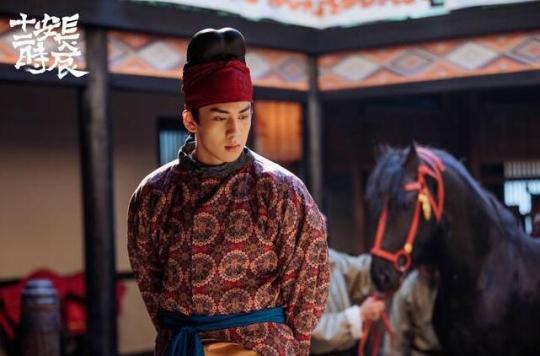
History facts behind The Longest Day in Chang’an (previous posts: 1, 2, 3, 4).
Prince Yong 永王 in the TV series is a composite character. His primary historical prototype is Li Lin, Prince Yong 永王 (or Yong-wang), but he also shares some similarities with another son of Emperor Xuanzong - Li Mao, Prince Shou (Shou-wang).
Li Lin’s mother died when he was only a few years old, and he was raised by Li Heng (Crown Prince Li Yu in the dorama, future emperor Suzong). It was said that at night, when Li Lin cried, Li Heng would hold him in his arms. (No wonder in the dorama, when Li Bi reports Li Yu about Li Lin’s betrayal, Li Yu looks heartbroken.)
After the An Lushan rebellion had begun, Li Lin fled to the south together with his father, Emperor Xuanzong. In the north Li Heng proclaimed himself the emperor and begin to fight the rebels.
While Xuanzong stayed in Sichuan (Shu), Li Lin took the rich lands of the former Wu kingdom south of Yangtze as his base. He decided to take advantage of the chaos and follow the example of the Eastern Jin Dynasty - to establish a new independent empire in the south.
This attempt failed. Li Lin lost the battle with Li Heng’s forces, was captured and secretly put to death. Li Heng, because of the love he had for Li Lin, chose not to publicly declare him a rebel. He relieved the general who killed Li Lin from his office and never gave him another one. Li Lin's sons were allowed to keep their titles, and none of his family suffered (the usual punishment for family members of rebels was extermination).
Prince Yong in the dorama shares with historical Prince Yong his name, his title and his ambitions. However, it is his harmonious relationship with Right Chancellor Lin Jiulang (historical Li Linfu) which makes him very similar to another Xuanzong’s son - Li Mao, Prince Shou.
After Emperor Xuanzong executed his three sons, including the first Crown Prince, Li Ying, in one day, it was Li Mao whom Li Linfu recommended as the next crown prince. However, after pondering for a year, Xuanzong chose Li Heng instead. In the following years Li Linfu initiated many coups trying to get rid of Li Heng and to make Li Mao the next emperor.
In the dorama Prince Yong is the one Lin Jiulang would prefer on the throne, and they join forces against Li Yu, just like historical Li Linfu and Li Mao.
17 notes
·
View notes
Photo

About the historical prototype of Yis “the Prince of Persia” in The Longest Day in Chang’an (yes, he does have a historical prototype! And a cool one!):
Let’s start with his claim that he is a descendant of the Persian royal family.
Yis says that his grandfather was a real Persian prince who had to fly from Persia. Most likely he refers to Belus or Bahram, the sons of the last king of the Sassanian Empire, Yazdegerd. After in 651 the Sassanian Empire in Iran was conquered by the Arabian Caliphate, Yazdegerd ran away and was robbed and killed by the Türks near the city of Merv. His sons, Belus and Bahram, went to China (along with many Persian refugees) to ask for help against the Caliphate. Emperor Gaozong welcomed the princes and built a palace for them in Chang’an (but didn’t send an army against the Arabs).
So descendants of Belus and Bahram most likely still lived in Chang’an in 744, when the action takes place.
But what about “Prince” himself?
Let’s try to figure out his real name first. 伊斯 yī sī (how he is called in Chinese) are just phonetics to convey the syllable “is” in foreign words like “islam“, “Isfahan“ (also “Yith” in Lovecraft’s the Great Race of Yith :D). Obviously, as a Persian Christian, “Prince” has to have either a Persian or a Christian name.
Have you heard about the Nestorian Stele - the most ancient Christian monument in China? It was erected in Chang’an in 781 by a Persian missionary whose name was spelled 伊斯 in Chinese. I see him referred to as Yazdhozid in the Chinese sources and as Yazdbazed in the English sources (idk why such difference). So Yazdbazed is the real name of our “Prince”!
The historical Yazdbazed wasn’t a descendant of Belus or Bahram - he was a son of a priest from Balkh. During Emperor Xuanzong’s reign (when the events of The Longest Day in Chang’an take place) Yazdbazed held a position at court. Xuanzong favored him and supported his monastery financially.
During the An Lushan rebellion (755-763) Yazdbazed served in the army of Emperor Suzong (Crown Prince Li Yu in the series) under famous general Guo Ziyi (also a Christian, according to some sources). Apparently, Yazdbazed gathered military intelligence through the network of the Nestorian believers (back then they were relatively numerous in China). Emperor Suzong appreciated him and greatly rewarded after the rebellion had been quelled.
After the war Yazdbazed continued his missionary work in Chang’an, providing in his monastery food, shelter and healing for those in need.
48 notes
·
View notes
Photo

So, who is the middleman between *spoiler* and *spoiler*? Who is the one that got them together and gave them the golden Persian coins?
Who is the third culprit in The Longest Day in Chang’an?
I’ve got two versions.
Obviously spoilers, so under the cut.
So, who is the middleman between Longbo and Xu Bin? Who is the one that got them together and gave them the Persian coins?
Version 1:
The key to this version is the historical Yao Runeng’s identity.
An official in red saves Yao Runeng saying that he’ll be of use to his master, gives him a Persian coin as a token, tells him to go to Anxi and helps to get out of Chang’an.
Historically, who was Yao Runeng? He was a minor magistrate who composed the first written biography of An Lushan - the History of An Lushan (An Lushan Shiji 安祿山史記) - apparently somewhere between 50 and 150 years after the An Lushan Rebellion had been quelled. This biography is a compilation of sources, and as a main source, it most likely uses the first known work to address the Rebellion, the now-lost Veritable Records of Emperor Suzong (Suzong Shilu 肅宗實錄): a collection of primary materials compiled shortly after the Rebellion.
Btw, the History of An Lushan is the only historical source that mentions the name of Zhang Xiaojing: he was an officer who took part in the Mawei mutiny in 756 and killed the Right Chancellor Yang Guozhong.
So, through the History of An Lushan Yao Runeng is linked to An Lushan. It’s possible that the Persian coin given to Yao Runeng is a token of An Lushan. Then An Lushan is the one who gave the coins to Longbo and Xu Bin. He is the missing link, the middleman between them.
What could have been An Lushan’s motive? Probably, to kill the royal family and disrupt the stability in the Empire.
So, version #1 - An Lushan.
Historically, in 744 An Lushan served as a military governor (jiedushi) in Pinglu (not in Anxi). He was close to Right Chancellor Li Linfu (dorama’s Lin Jiulang) and didn’t yet have either powerbase or motive to rebel (which he’ll do in 755, after Lin Jiulang dies, and the next Right Chancellor, Yang Guozhong, antagonizes himself with An Lushan and basically forces him to rebel in order to protect himself).
Version 2:
The key to this version is a place called Lingwu. It’s in north-central China, in present-day Ningxia region between Gansu and Shaanxi provinces. Historically, the Crown Prince will declare himself emperor in Lingwu after the Maweipo mutiny in 756.
In the series, Lingwu is mentioned very often. The Crown Prince successfully implemented there a new tax policy - invented for him by Xu Bin. Also that’s where the Crown Prince has a palace and even trains some kind of his own military forces. The generals stationed in Lingwu are the Crown Prince’s supporters. Longbo bought in Lingwu a piece of land to bury his dead comrades and lived there for some time. Xu Bin sends to Lingwu the innkeeper and his father who escorted the Emperor to him, so evidently he has some connections there and considers Lingwu to be the safest place.
So Xu Bin, Longbo and the Crown Prince are all connected through Lingwu.
Also who brought to Chang’an the chief of the Turkic Wolfguards - the one who accepted Longbo’s bribe and used his people as decoys? General Wang Zhongsi - a close friend of the Crown Prince.
It’s also worth to mention that the Crown Prince left the feast on his own accord just before the explosion. And he repeatedly warned Li Bi that his job is only to catch the Wolfguards, nothing more.
In the dorama Yao Runeng is a childhood friend of the Crown Prince so it’s also plausible that the Crown Prince would want to save Yao Runeng despite him being a spy.
Also why does He Zhizheng put Li Bi to sleep just before the end of the investigation? It makes sense only if He Zhizheng wanted to prevent Li Bi from learning the truth. And what kind of truth that could be that Li Bi needs to be protected from? Only the involvement of the Crown Prince.
He Zhizheng says he wants to protect Li Bi, and then reminds the Crown Prince that Li Bi is very honest and loyal, and will be useful to him in the future - it sounds as if He Zhizheng is afraid that the Crown Prince may kill Li Bi, and tries to dissuade him. Or He Zhizheng wants to spare Li Bi from a conflict between his obligation to uncover the truth and his loyalty to the Crown Prince. Or both.
Was the indecisiveness and the filial piety displayed by the Crown Prince just an act? Perhaps. That’s how He Zhizheng describes the Crown Prince in ep.18: “The emperor has over twenty sons, but only the crown prince is subtle and decisive with his actions. He is a force to be reckoned with that is lurking in the dark.”
And historically the Crown Prince will indeed become the emperor by means of a coup - by instigating the Maweipo mutiny.
What are the Crown Prince’s motives? Potentially he could gain a lot at every turn of events: Peacemaker Corps prevents the explosion? He is the one to take credit for it. Lin Jiulang is killed? Good! The Emperor is killed? Perfect! Even in the end the Crown Prince still manages to win - by burning the evidences against the Right Chancellor he finally gains his father’s trust. (Considering that the Emperor helps him burn the evidences, he obviously would have never punished Lin Jiulang anyway.)
So, version #2 - the Crown Prince.
9 notes
·
View notes
Text
Random Stuff #7: the Characters of “The Longest Day in Chang’an” that Really Existed (Part 2)
(Part 1 Here)
Yuan Zai (元载/元載) and Wang Xunxiu (王韫秀/王韞秀):
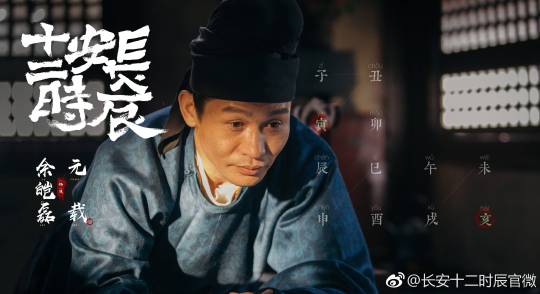
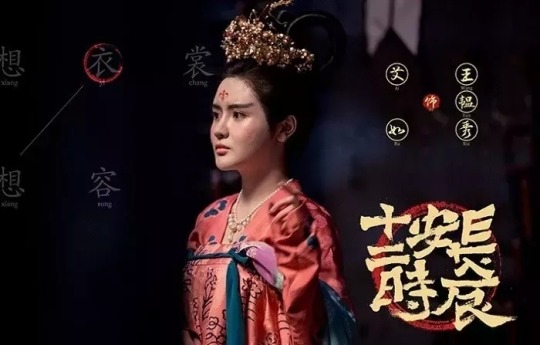
Yuan Zai in the drama was arguably even more manipulative than Lin Jiulang, and this is somewhat historically accurate, though like Lin Jiulang's historical counterpart Li Linfu, Yuan Zai also had some accomplishments, like promoting people who were good at finances. However, after he became the chancellor during Emperor Daizong's reign (Daizong is the eldest son of Suzong), he became extremely corrupt, only giving promotions to people who gave him gifts. While chancellor, Yuan Zai was also a major political opponent against Li Bi. But because he was corrupt, and because people envied his power within the court, Yuan Zai gradually fell out of favor with Emperor Daizong. Eventually, Yuan Zai (and his entire family) was ordered to commit suicide.
Yuan Zai's relationship with his wife Wang Yunxiu, however, was very different from the depiction in the drama. Yuan Zai married Wang Yunxiu even before he came to Chang'an in pursuit of a better career. In fact, Wang Yunxiu was the one who encouraged him to do so. Before setting out for Chang'an, the pair exchanged poems with each other (both poems are in the collection "Complete Collection of Tang-era Poems", or 《全唐诗》), so the love was probably mutual and not manufactured for a purpose.
Yao Runeng (姚汝能):

Historically, Yao Runeng was not the descendant of the famous Tang dynasty chancellor Yao Chong (姚崇). Actually, he was a relative "nobody", just like Zhang Xiaojing. So it was fitting that the real Yao Runeng would be the author of the book ("The Deeds of An Lushan") that contained the only real record about Zhang Xiaojing.
About that book he wrote: it's been speculated that the big boss behind the Persian gold coins was An Lushan, who was the perpetrator of the rebellion that destroyed Chang'an a mere 10 years later. Since Yao Runeng was given a gold coin in the last episode, him being the real-life author of a book about An Lushan and the rebellion becomes rather interesting.
Cheng Shen (程参)/ historical: Cen Shen (岑參):
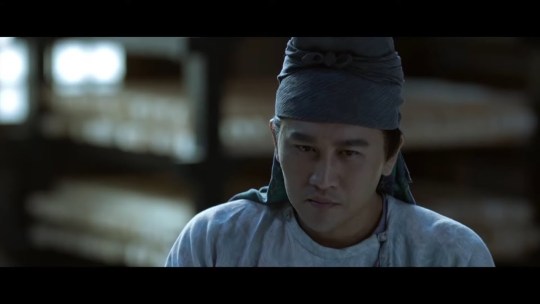
Like He Zhizhang, Cen Shen was also known more for his poetry. While He Zhizhang was more well-known but only has 19 surviving poems, Cen Shen has a whopping 360 surviving poems, mostly about his travels near the border.
Yan Yuhuan (严羽幻)/ historical: Yang Yuhuan (楊玉環):


Yan Yuhuan's historical counterpart, Yang Yuhuan, is arguably the most historically famous female from the drama. Heck, she might be one of the the most famous women from Chinese history, period. Her fame came from her looks, so much so that she became one of the four most beautiful women of Chinese history. It was no wonder that Li Longji/Xuanzong (the emperor depicted in the drama) was captivated by her. She was also distantly related to Yang Guozhong, the treacherous chancellor that Zhang Xiaojing killed (according to Yao Runeng's book).
Unfortunately for Yang Yuhuan, during the rebellion, everyone thought she was the cause of the unrest (not true; there were many many other causes) and a "bad influence" for the emperor , so the emperor ordered her to hang herself. In short, she became another sacrifice in a society controlled by men.
Xu Hezi (许合子)/ historical: Xu Hezi (許鶴子):

If the real Yan Yuhuan's story was the tragedy of a beautiful Tang-era woman, the real Xu Hezi's story was the tragedy of a Tang-era female entertainer. The historical Xu Hezi was also a famous singer of commoner descent, but when the rebellion happened, she was forced to escape Chang'an, and died a lowly entertainer/prostitute.
Guo Lishi (郭利仕)/ historical: Gao Lishi (高力士):

Li Bi's "uncle Guo" wasn't explicitly mentioned as a eunuch in the drama, though his headwear gave it away (his headwear is called "long jin"/籠巾, and is usually reserved for eunuchs in historical dramas). Historically, Gao Lishi was a powerful eunuch who was first favored by Wu Zetian (the first and only female Chinese emperor), then Li Longji/Xuanzong. Gao Lishi was very corrupt: rumors suggest he had more money than the national treasury. However, he was also very loyal. Upon hearing of Li Longji/Xuanzong's death in 762 AD, he fell ill out of grief, and died.
Others:
(These people who appeared in the drama were also taken from history, and because their roles in the drama were small, I will only list their names here. It is worth noting, however, that although their roles seemed small in the drama, they were all influential people in Tang court in 744 AD)
Gan Shoucheng (甘守诚/甘守誠)
Mao Shun (毛顺/毛順)
Jiao Sui (焦遂)
Chen Xuanli (陈玄礼/陳玄禮)
Ji Wen (吉温/吉溫)
Luo Xishi (罗希奭/羅希奭)
Wang Hong (王鉷)
Chen Xilie (陈希烈/陳希烈)
Pei Dunfu (裴敦复/裴敦復)
Wei Jian (韦坚/韋堅)
Huangfu Weiming (皇甫惟明)
Li Jingzhong (李静忠/李靜忠)/ later changed to Li Fuguo (李輔國)
Han Chaozong (韩朝宗/韓朝宗)
Li Shizhi (李适之/李適之)
133 notes
·
View notes
Text
Random stats of today
Number of decrees quoted in each of the WS annals:
WS01 (Preliminary annals): 0
WS02 (Taizu): 3
WS03 (Taizong): 5
WS04 (Shizu): 15
WS05 (Gaozong): 15
WS06 (Xianzu): 6
WS07 (Gaozu): 63
WS08 (Shizong): 32
WS09 (Suzong): 37
WS10 (Xiaozhuang): 4
WS11 (The Former Deposed Emperor, the Latter Deposed Emperor, the Expelled Emperor): 14
WS12 (Xiaojing): 1 (Scroll “restored” from the Beishi)
1 note
·
View note